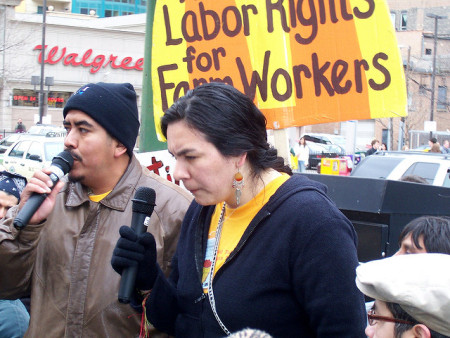What About Farmworker Women?
 Wednesday, February 7, 2018 at 5:57PM by
Wednesday, February 7, 2018 at 5:57PM by  Jennie Belle
Jennie Belle By Valery Arevalo, Paralegal at the Farmworker Unit of Legal Aid NC
In light of the efforts to raise awareness of the prevalence of sexual assault and harassment in the workplace, the phrase "me too" has surfaced on social media to show the magnitude of the issue and how much it is ingrained in our society. Though the voices of Hollywood actresses have been a great way to spark the conversation of a widespread act of injustice, what about the stories of those who are silenced?
It is important to take into consideration the plight of economically disadvantaged women who live in silence with these behaviors in their workplace. They are the most vulnerable to these abuses.
At the Golden Globe Awards, Oprah spoke about an open letter written on behalf of the Alianza Nacional de Campesinas, the National Alliance of Female Farmworkers, comprised of about 700,000 female farmworkers. The letter expressed the gratitude of the farm worker alliance towards these powerful women who spoke out, as well as conveyed the fact that their stories went on in silence, in the shadows, and unreported out of fear. Though commendable, the women of the farmworker alliance stated that they felt as though they did not have the same privilege as these public figures did in speaking out. Their stories did not come with glamour and crowds of a supportive audience, but with the endless fear of threats, failure to provide for their families, and being retaliated against.
A report last year by the Equal Employment Opportunity Commission found that when someone is sexually harassed at work, the most common response was to avoid the harasser or ignore the behavior. The mentioned report stated that sexual harassment training across the board does not place an emphasis on the issue as means of prevention, or to protect its employees, but rather a way for industries to avoid legal liability. The report further emphasizes the issue at hand, that sexual harassment has become an issue that is swept under the rug so to speak, failing to protect employees of various industries in the places where they spend the majority of their time. According to reports from the National Farmworker Ministry, females in the fields are often given the lowest-paying jobs, are the first to be laid off, receive fewer opportunities to advance, and face a culture of discrimination and machismo in the workplace, on top of that, adding the element of being harassed.
The fact of the matter is that cases of sexual harassment and assault are part of the reality of the farm worker world. 90% of female farm workers that participated in a study in California identified sexual harassment as a problem in their work place. Being that women make up 22% of the agricultural workforce, the rate is alarming. Fear of retaliation, threats due to their legal status, and the need to maintain financial stability to provide for their families play a crucial role in the lives of these workers, which is why it is of utmost importance to educate this community of the dangers of sexual harassment, what it looks like, and how they can speak out against it by knowing their rights. They are usually the primary caregivers of their families, and for that very reason, they are reluctant to take legal action against their aggressors.
These are some of the behaviors that by law are often considered acts of sexual harassment:
-Promising employment benefits in exchange for sexual favors
-Threats as a result of declining sexual advances
-Sexual abuse
-Vulgar comments
-Soliciting or demanding any sort of sexual act
-Unwelcome physical contact of any sort
It is important for the farm worker community to understand that they are in their right to decline any type of sexual advances, record the times and dates where these incidents have taken place, report these acts to a supervisor, the police, or a legal service provider of their choice. “It is a blatant violation of the law that any employer takes adverse action against the victim because the individual reports the act.
Working in a safe environment is a right, regardless of any type of status. There is enough abuse that goes in the workplace as it is, and sexual harassment is unacceptable. It is our duty as humans to report these incidents that affect those who do not feel at liberty to speak out.
If you work with farmworker women, please give them a copy of this info graphic about sexual harassment, created by our office, the Farmworker Unit at Legal Aid of North Carolina.
Should you become aware of any case of sexual harassment, please report and refer to our office by calling 919-856-2180.













